Eighty years ago this month, Nazi Germany was surrounded by Soviet and Allied forces and on the brink of defeat.
The so-called "Big Three" world leaders - British Prime Minister Winston Churchill, US President Franklin D Roosevelt and Soviet General Secretary Joseph Stalin - met in Yalta, on Crimea's Black Sea coast, to decide the fate of Germany and wider Europe.
There was no question that any Nazi leaders would be invited: the only thing that awaited them was a trial and the end of a rope.
And in a show of power politics, the Big Three also decided to exclude their French counterpart Charles de Gaulle.
The carve-up of the European continent would be decided by them alone.
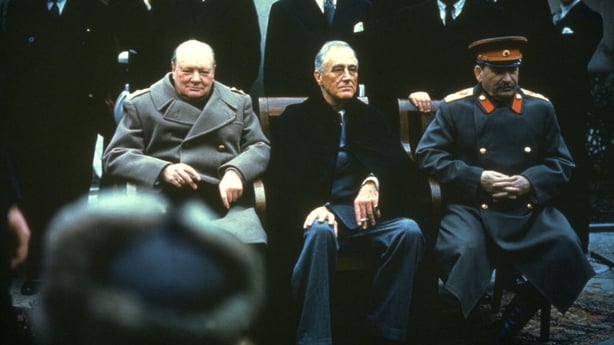
Eight decades later, and power politics is back with a vengeance.
It appears that US President Donald Trump and Russian President Vladimir Putin are intent on deciding the fate of Ukraine - blatantly excluding its president, Volodymyr Zelensky, from the talks process.
In this new world - at least for the four years that President Trump is in the White House - Europe is faced with a United States which rejects multilateral politics in favour of transactional hardball.
This begs serious questions about the ability of the EU, and the UK, to respond in a cohesive manner.
These moves have inevitably shone a spotlight on Ireland’s approach to the thorny issue of its own security and defence.
Since 2022, the Irish Government has been carrying out a programme of modernising Ireland's security in line with recommendations by the Commission on the Defence Forces.
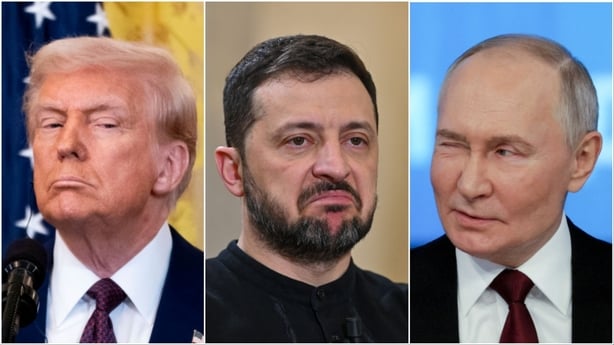
The Cabinet decided on what has been termed "level of ambition 2" which commits to an increase in Defence Forces spending to €1.5 bn, from €1.16 bn, by 2028.
Speaking to me before departing for the G20 meeting in South Africa this week, Tánaiste and Minister for Defence Simon Harris noted that spending on security has increased by 30% in recent years.
"This year we'll see the highest defence budget ever in Ireland at €1.35bn. But there is more that we need to do, and this Government's fully committed to doing just that," he said.
A radical overhaul is badly needed, according to Tom Clonan, Independent Senator and former Defence Forces officer.
He claims that security in Ireland is at "crisis point" given that its military cannot even tell the identity of aircraft in our skies due to an absence of the necessary radar systems.
"Our capacity to assert our sovereign status as a Republic is compromised by the fact that we have to have the RAF patrolling our airspace - NATO patrols our airspace, essentially. We need to be able to do that ourselves," he said.
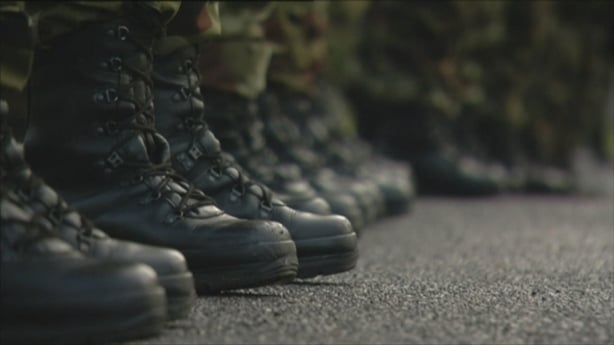
Senator Clonan says the absence of what he terms such "functional prerequisites" are noticed by our EU colleagues: "By being provocatively weak, we could be seen as Europe's weakest link in terms of, you know, access to the European Union. We’re leaving the back door open."
The Tánaiste said the Government is going to act.
"I think the key priority that I have right now is speeding up the delivery of commitments that have already been made and, crucially, delivering radar and sonar capacity for our Defence Forces, for our Naval Service," he said.
These investment commitments, along with plans to increase Defence Force numbers from just under 8,000 to 10,000 personnel by 2028, are quite a turnaround from only a few years ago when the families of rank-and-file members were protesting on the streets for better pay and conditions.
Even President Michael D Higgins weighed in back in 2019.
As the Commander-In-Chief of the Defence Forces, he declared: "It is not too much, I would suggest, to accept that serving men and women should have conditions - including an income and prospects - that are sufficient to provide for themselves and their families."
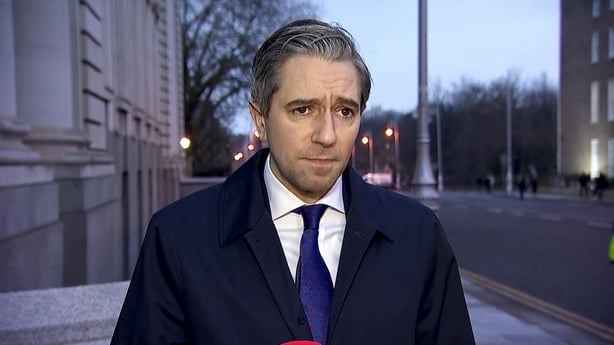
Yet, implementing substantive change was never going to be easy. Recruitment is just one example.
In 2022, the Defence Forces were haemorrhaging members at a rate of ten a week.
Data from 2024 reveals "a plateauing" of that downward trend, helped by financial incentives including a doubling of the patrol duty allowance, an extension of the Naval Service tax credit, and private medical care for all ranks.
The Government will have to work much harder on this, if the target of 2,000 additional members by 2028 is to be reached.
Senator Clonan argues that the Government should go a step further and move to "level of ambition 3" as defined by the Commission on the Defence Forces three years ago.
That would be an annual investment in the Defence Forces of €3bn, bringing it close to the EU average.
Read more: US senator calls on Ireland to increase defence spending
He said: "We basically don't have the capacity to gather primary intelligence. The primary intelligence agency in Ireland is An Garda Síochána and they're expected to do everything from traffic to immigration.
"We're so far behind the curve in international terms. And that's not a criticism of the great people in An Garda Siochana or the Defence Forces. It's just a fact."
Last week, there appeared to be support for that position in Government when Minister for Health Jennifer Carroll MacNeill said that spending on defence should be doubled, in the context of a discussion on the need to protect undersea cables in our territorial waters.
She was responding to an unexpected intervention by the Chair of the US Foreign Relations Committee Jim Risch.
Answering a question put by RTÉ News reporter Jackie Fox, the Idaho Senator contended that Ireland's "strategic position" comes with "significant responsibility" and that our defence budget should be increased.
Minister of State for Defence Thomas Byrne later ruled that out, saying Ireland’s Defence Forces are already in the process of being transformed.
No doubt all of this will be thrashed out by the new Oireachtas Committee on Defence and Security which is to be established shortly, according to Taoiseach Micheál Martin.
High on its agenda will be cyber security, and "hybrid threats", defined by the EU as "...coordinated and synchronised actions that deliberately target democratic states and institutions' systemic vulnerabilities through a wide range of means."
Particular attention will be paid to the vulnerability of the 550+ international subsea cables, 75% of which pass through or close to Irish waters.
As it stands, threats to the State are assessed by the National Security Committee which is chaired by the Secretary General to the Government, other senior officials, along with representatives from the gardaí and Defence Forces.
This highly confidential and little-known committee ensures that the Taoiseach is fully briefed on what’s termed "cross-cutting national security issues".
That loop is about to get wider.
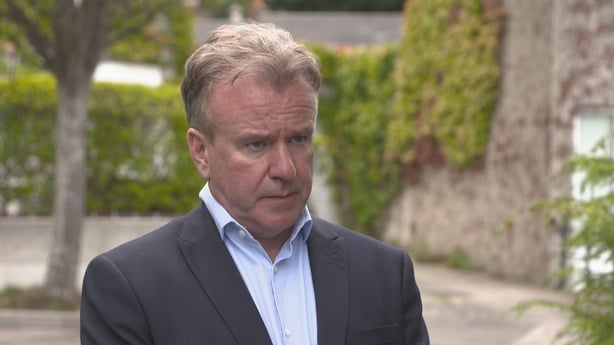
There are now plans to establish what’s termed a "Ministerial Council" ensuring that security briefings will include other Cabinet members along with the Taoiseach.
But whenever the Government discusses an increase in military spending, or international military cooperation, it raises real concerns that Ireland’s neutrality could be compromised.
At Leinster House this week, People Before Profit leader Richard Boyd Barrett warned that we need to be constantly wary of who is pushing for increased defence spending.
He namechecked Mr Trump, and said the public knows that the US President is "not benign".
Mr Harris says he is keenly aware of public concerns.
"Let me be very clear, there is no plan… no intention at all… ever… to change our position in relation to military neutrality. But you can say that and, in the next breath, say that it is important we take defence and security seriously.
"That's why we're going to develop a new maritime security strategy," he said.
Senator Clonan insists that Ireland’s neutral status is "respected in the world" and that we should continue to use this soft power on the global stage.
He says NATO membership would bring "no benefit to us", adding dryly "...we wouldn’t be accepted - the prerequisites just aren’t there".
As Ireland grapples with its defence plans, the world awaits to learn the fate of Ukraine, in some private deal being cooked up between Mr Trump and Mr Putin.
It seems the US President has already acceded to Moscow’s demand to recognise its annexation of Crimea - and this, of course, includes the coastal resort of Yalta, where Europe was carved-up by the Big Three in 1945.







